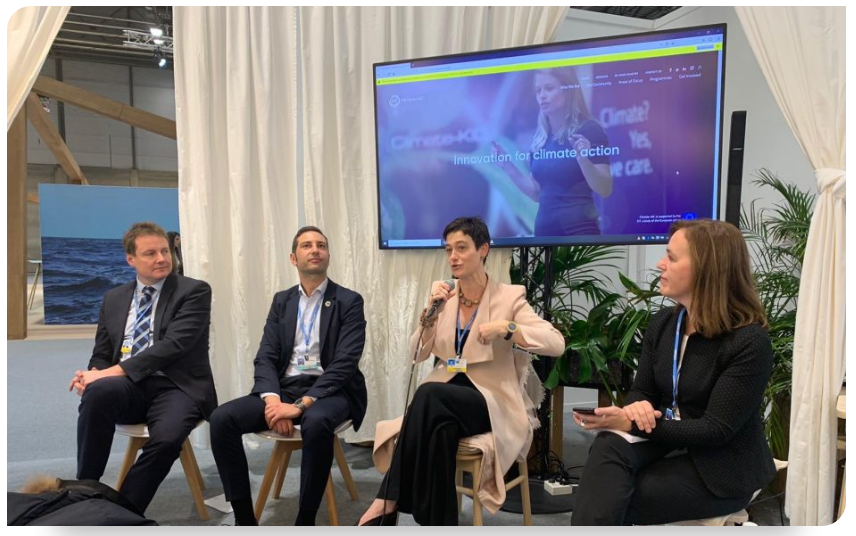EIT Climate-KIC holds panel discussion at COP25

On 06 December 2019, EIT Climate-KIC holds a panel discussion on 'Transformation, In Time strategy' and its Deep Demonstrations, as well as the financial tools needed to deliver on them.
The panel also explored how new technologies like blockchain could accelerate the Paris Agreement targets and how a policy foundation for an emissions trading system could pave the way for a global price on carbon. The discussion was moderated by EIT Climate-KIC’s Head of International Relations, Felicity Spors, who posed the following questions to the panellists:
What are the necessary levers and/or the most valuable levers of change to trigger systemic transformation?
The panel discussed the importance of measuring impact, but also how key performance indicators (KPIs) can be narrow in scope, missing the important context, etc. Moreover, there’s a lack of clear boundaries for measuring transformative systems change.
Another point that was raised is the perceived inflexibility of innovation funding at the European level: 'We need to change the way we think about innovation!'
What are the key challenges to orchestrating systemic impact at European level?
The panel said placing humans at the centre of systems change by understanding local cultural identities is one of the greatest challenges. The Paris Agreement targets necessitate 'rapid, far-reaching and unprecedented changes in all aspects of society,' yet these changes must be carried out in an equitable way, referred to as 'just transition,' and must involve all members of society, especially those most affected. The transition must be handled mindfully, as it risks social unrest, exacerbation of inequalities, and more.
EIT Climate-KIC is working with the Silesia region in Poland, which has a deep cultural identity associated with coal mining—it’s an important element of the region’s history. By talking with people from this region, EIT Climate-KIC found they identify as hard workers and risk-takers rather than coal miners. Regional transitions to clean energy production can take these kinds of local identities into account to facilitate a mindset shift and transition workers from unhealthy, polluting work environments to safe, clean and rewarding ones.
Just transition was also an important topic at COP24. Learn more about EIT Climate-KIC’s work on transforming high-carbon regions to zero-carbon innovation hotspots here.
How can we ensure transformative change happens at the speed we need?
The panel emphasised the importance of moving from single-point solutions towards a portfolio approach—supporting and connecting innovations to one another such that they mutually drive impact. Scoping this work becomes an obvious challenge, with the likelihood of positive spillover effects. Therefore, we need to expand our notion of how we measure systems change.
Moreover, working with all levels of society—corporations, public bodies, universities and citizens—creates connected and even collaborative change agents, thereby endowing societal progress with resilience. EIT Climate-KIC is mapping synergies between its large and diverse community using an AI tool called Exaptive. Exaptive helps identify gaps in EIT Climate-KIC’s work, as well as unusual partnerships—which are often best poised to catalyse innovation. This is also why deliberately allotting funding to high-risk initiatives with unusual actors could speed up transformative change.
How can we fund this systemic transformation? What tools and mechanisms should be explored?
The panellists suggested adopting a co-funding approach whereby all parties involved share the responsibility. This is what EIT Climate-KIC is doing with its Deep Demonstraions, most recently exemplified by its partnership with Slovenia, as it will support the country in its commitment to move towards a circular economy.
The panel also re-asserted the need for innovation funding from public sources that expressly support high-risk, high-impact and low-probability work. This allows innovation frontrunners to go fast and far.
EIT Climate-KIC’s Transformation Capital initiative is looking at new financing mechanisms designed to trigger systemic transformations. It seeks to move finance from a single sector and single instrument approach to a blended finance approach that invests across sectors and with a wide variety of financial instruments—all working together to support the transition to a zero-carbon society.
How can blockchain be leveraged for climate action?
The conversation then turned to Francisco Benedito’s work with blockchain technology and ClimateTrade, whose vision is to be the most disruptive and exponential fin-tech company in the environmental sector and to accelerate the achievement of the Sustainable Development Goals, focusing on the client.
ClimateTrade has built an ecosystem where companies and consumers can easily determine how to offset their carbon footprint, and also how to invest in green financial products, disruptive technologies and projects that aim to tackle climate change.
Its use of blockchain technology enables it to be transparent: Every transaction and its associated value are visible to anyone with access to the system. It’s also fast: Blockchain guarantees a faster implementation of programmed tasks and actions, and quick reclaim of the information and assets in the ledger. And finally, it’s efficient: Blockchain reduces the costs involved in verifying transactions, by removing the need for trusted third-parties.
Read the EIT Climate-KIC report on distributed ledger technology and blockchain


 Share this page
Share this page


